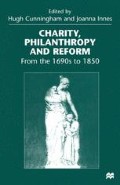Abstract
The challenges now faced by the welfare states established in the middle of the twentieth century have prompted a renewed interest in the role of voluntary action both in the present and in the past. In the historiography which celebrated the rise of welfare states from the mid-nineteenth century onwards, charity and philanthropy were depicted in retreat, inadequate to cope with the complex problems of urban and industrial societies. As the Whiggish and teleological underpinnings of that historiography have begun to be challenged, the role of charity and philanthropy has opened up for enquiry.
Access this chapter
Tax calculation will be finalised at checkout
Purchases are for personal use only
Preview
Unable to display preview. Download preview PDF.
Notes
For challenges to the traditional historiography, see e.g. G. Finlayson, Citizen, State and Social Welfare in Britain 1830–1990 (Oxford, 1994)
M. Daunton (ed.), Charity, Self-Interest and Welfare in the English Past (London, 1996).
Quoted in B. Geremek, Poverty: A History (Oxford and Cambridge, Mass. 1994), p. 232
cf. J. Barrell, The Dark Side of the Landscape: The Rural Poor in English Painting, 1730–1840 (Cambridge, 1980).
C. Jones, Charity and Bienfaisance: The Treatment of the Poor in the Montpellier Region 1740–1815 (Cambridge, 1982), p. 75.
S. Woolf, The Poor in Western Europe in the Eighteenth and Nineteenth Centuries (London and New York, 1986), p. 18.
V. Hunecke, ‘The abandonment of legitimate children in nineteenth-century Milan and the European context’, in J. Henderson and R. Wall (eds.), Poor Women and Children in the European Past (London and New York, 1994), pp. 117–35.
A. Rees, quoted in G. M. Ditchfield, ‘English rational dissent and philanthropy, c.1760-c.1810’, infra. p. 195.
W. Roscoe, quoted in K. Lloyd and C. Burgoyne, ‘The evolution of a transatlantic debate on penal reform, 1780–1830’, infra. p. 223.
B. H. Slicher Van Bath, The Agrarian History of Western Europe, AD 500–1850 (London, 1963), pp. 221–7
O. H. Hufton, The Poor of Eighteenth-Century France 1750–1789 (Oxford, 1974), pp. 13–16.
D. L. Ransel, Mothers of Misery: Child Abandonment in Russia (Princeton, 1988), p. 56.
D. T. Andrew, ‘Noblesse oblige. Female charity in an age of sentiment’, in J. Brewer and S. Staves (eds.), Early Modern Conceptions of Property (London and New York, 1995), pp. 275–300.
Editor information
Editors and Affiliations
Copyright information
© 1998 Hugh Cunningham
About this chapter
Cite this chapter
Cunningham, H. (1998). Introduction. In: Cunningham, H., Innes, J. (eds) Charity, Philanthropy and Reform. Palgrave Macmillan, London. https://doi.org/10.1007/978-1-349-26681-4_1
Download citation
DOI: https://doi.org/10.1007/978-1-349-26681-4_1
Publisher Name: Palgrave Macmillan, London
Print ISBN: 978-1-349-26683-8
Online ISBN: 978-1-349-26681-4
eBook Packages: Palgrave Social & Cultural Studies CollectionSocial Sciences (R0)

